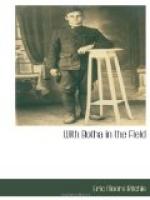A cheer went up as the flag fluttered up in the noon sunlight. Windhuk was naturally regarded as the Mecca, so to speak, of the invading army.
[Illustration: At the Gate of Windhuk. Headquarters Staff Motors awaiting entry] [Illustration: At the Gate of Windhuk. General Botha discusses matters with the Governor of Windhuk]
[Illustration: At the Gate of Windhuk. The Interpreter] [Illustration: At the Gate of Windhuk. General Botha emphasises]
With the interests of the civilised world fixed on the vast slaughter-grounds of Europe, I shall not spend much time describing Windhuk. It is a pretty, picturesque little town, built amongst brown and purple hills. In most ways it is highly finished; reflects the spirit of German thoroughness that is an admitted attribute of the race. As usual in South-West Africa, it has nothing of the colonial town about it; it might be another suburb of Berlin. Many of the houses are thoroughly built into the sides of the surrounding kopjes—perched like great red-roofed cages on the hillsides. The place doesn’t seem to have a single industry of its own; but then, as I said elsewhere, there is hardly an established industry in the Protectorate.
There is one thing about Windhuk that grips your attention—and holds it in no uncertain manner, too. One of the great objectives of the South-West campaign was to secure the Windhuk wireless station. When you see this—catch a glimpse of it suddenly where it stands on the veld outside the town—you get a thrill of sheer astonishment. The thing seems monstrous there. It is foreign to our ideas—a wireless colossus in such a place. Had I seen this vast piece of work in a humming city that stands warden to the seas it would have fitted in. But where it is—well, it just surprised. Fancy a pretty bijou veld town, red roofs, neat church, pepper trees, aeromotors, sleepy people and everything—and across the veld, a mile and a half away, darkening the sky with great vertical lines, five terrific steel lattice pillars, nearly four hundred feet high, tied by cables with stay bolts as big as a man; their aerials sweep from pillar to pillar, answer to the wind the deepest note of a giant ’cello, and eavesdrop and conjure amongst the news markets of the world. Now there is no electric light in this village of Windhuk, or Windy Corner, yet. What was the idea with this stupendous thing? And there are not enough Germans in the place—or in the whole territory, if it comes to that—to populate a good-sized town. There is also the usual telegraphic communication to the coast, etc. Yet—the wireless.




